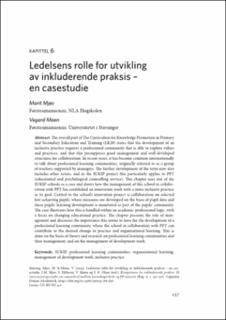| dc.contributor.author | Mjøs, Marit | |
| dc.contributor.author | Moen, Vegard | |
| dc.date.accessioned | 2023-10-11T11:37:28Z | |
| dc.date.available | 2023-10-11T11:37:28Z | |
| dc.date.created | 2023-03-27T15:49:10Z | |
| dc.date.issued | 2023 | |
| dc.identifier.citation | Mjøs, M. & Moen, V. (2023). Ledelsens rolle for utvikling av inkluderende praksis – en cas estudie. I M. Mjøs, S. Hillesøy, V. Moen og S. E. Ohna (red.), Kompetanse for inkluderende praksis. Et innovasjonsprosjekt om samarbeid mellom barnehage/skole og PP-tjeneste (Kap. 6, s. 137–157). Cappelen Damm Akademisk. | en_US |
| dc.identifier.isbn | 978-82-02-79483-5 | |
| dc.identifier.uri | https://hdl.handle.net/11250/3095795 | |
| dc.description.abstract | The overall part of The Curriculum for Knowledge Promotion in Primary and Secondary Education and Training (LK20) states that the development of an inclusive practice requires a professional community that is able to explore values and practices, and that this presupposes good management and well-developed structures for collaboration. In recent years, it has become common internationally to talk about professional learning communities, originally referred to as a group of teachers supported by managers. The further development of the term now also includes other actors, and in the SUKIP project this particularly applies to PPT (educational and psychological counselling service). This chapter uses one of the SUKIP-schools as a case and shows how the management of this school in collabo ration with PPT has established an innovation work with a more inclusive practice as its goal. Central to the school’s innovation project is collaboration on selected low-achieving pupils, where measures are developed on the basis of pupil data and these pupils’ learning development is monitored as part of the pupils’ community. The case illustrates how this is handled within an academic-professional logic, with a focus on changing educational practice. The chapter presents the role of man agement and discusses the importance this seems to have for the development of a professional learning community, where the school in collaboration with PPT can contribute to the desired change in practice and organizational learning. This is done on the basis of theory and research on professional learning communities and their management, and on the management of development work. | en_US |
| dc.language.iso | nob | en_US |
| dc.publisher | Cappelen Damm Akademisk | en_US |
| dc.relation.ispartof | Kompetanse for inkluderende praksis : Et innovasjonsprosjekt om samarbeid mellom barnehage/skole og PP-tjenesten | |
| dc.rights | Navngivelse-Ikkekommersiell 4.0 Internasjonal | * |
| dc.rights.uri | http://creativecommons.org/licenses/by-nc/4.0/deed.no | * |
| dc.subject | SUKIP | en_US |
| dc.subject | inklusiv praksis | en_US |
| dc.subject | PP-tjenesten | en_US |
| dc.title | Ledelsens rolle for utvikling av inkluderende praksis : en case-studie | en_US |
| dc.type | Chapter | en_US |
| dc.description.version | publishedVersion | en_US |
| dc.subject.nsi | VDP::Samfunnsvitenskap: 200::Pedagogiske fag: 280 | en_US |
| dc.source.pagenumber | 137-157 | en_US |
| dc.identifier.doi | 10.23865/noasp.186.ch6 | |
| dc.identifier.cristin | 2137314 | |
| dc.relation.project | Norges forskningsråd: 296636 | en_US |
| cristin.ispublished | true | |
| cristin.fulltext | original | |
| cristin.qualitycode | 1 | |

